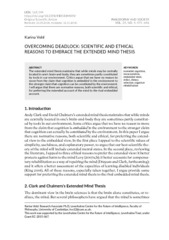Overcoming Deadlock: Scientific and Ethical Reasons to Embrace the Extended Mind Thesis
Чланак у часопису (Објављена верзија)
Метаподаци
Приказ свих података о документуАпстракт
The extended mind thesis maintains that while minds may be centrally
located in one’s brain-and-body, they are sometimes partly constituted
by tools in our environment. Critics argue that we have no reason to
move from the claim that cognition is embedded in the environment to
the stronger claim that cognition can be constituted by the environment.
I will argue that there are normative reasons, both scientific and ethical,
for preferring the extended account of the mind to the rival embedded
account.
Prema tezi o proširenom duhu iako se naši umovi prevashodno nalaze u našem mozgu i telu, njih ponekad delimično ustanovljuju delovi naše sredine. Kritičari tvrde da nemamo razloga da od teze da je naša kognicija uronjena u našu sredinu napravimo korak ka prihvatanju jače teze prema kojoj je naša kognicija konstituisana našom sredinom. U ovom radu, pokazujem da postoje normativni razlozi, naučni i etički, da prihvatimo tezu o proširenom duhu umesto suparničke, uronjene, teze.
Кључне речи:
extended cognition / intracranialism / embedded mind / ethics / rehabilitation / selectionИзвор:
Filozofija i društvo/Philosophy and Society, 2018, 29, 4, 489-504Издавач:
- Beograd : Institut za filozofiju i društvenu teoriju
URI
http://journal.instifdt.bg.ac.rs/index.php?journal=fid&page=article&op=view&path%5B%5D=700http://rifdt.instifdt.bg.ac.rs/123456789/1966
Институција/група
IFDTTY - JOUR AU - Vold, Karina PY - 2018 UR - http://journal.instifdt.bg.ac.rs/index.php?journal=fid&page=article&op=view&path%5B%5D=700 UR - http://rifdt.instifdt.bg.ac.rs/123456789/1966 AB - The extended mind thesis maintains that while minds may be centrally located in one’s brain-and-body, they are sometimes partly constituted by tools in our environment. Critics argue that we have no reason to move from the claim that cognition is embedded in the environment to the stronger claim that cognition can be constituted by the environment. I will argue that there are normative reasons, both scientific and ethical, for preferring the extended account of the mind to the rival embedded account. AB - Prema tezi o proširenom duhu iako se naši umovi prevashodno nalaze u našem mozgu i telu, njih ponekad delimično ustanovljuju delovi naše sredine. Kritičari tvrde da nemamo razloga da od teze da je naša kognicija uronjena u našu sredinu napravimo korak ka prihvatanju jače teze prema kojoj je naša kognicija konstituisana našom sredinom. U ovom radu, pokazujem da postoje normativni razlozi, naučni i etički, da prihvatimo tezu o proširenom duhu umesto suparničke, uronjene, teze. PB - Beograd : Institut za filozofiju i društvenu teoriju T2 - Filozofija i društvo/Philosophy and Society T1 - Overcoming Deadlock: Scientific and Ethical Reasons to Embrace the Extended Mind Thesis IS - 4 VL - 29 SP - 489 EP - 504 DO - 10.2298/FID1804489V ER -
@article{
author = "Vold, Karina",
year = "2018",
abstract = "The extended mind thesis maintains that while minds may be centrally
located in one’s brain-and-body, they are sometimes partly constituted
by tools in our environment. Critics argue that we have no reason to
move from the claim that cognition is embedded in the environment to
the stronger claim that cognition can be constituted by the environment.
I will argue that there are normative reasons, both scientific and ethical,
for preferring the extended account of the mind to the rival embedded
account., Prema tezi o proširenom duhu iako se naši umovi prevashodno nalaze u našem mozgu i telu, njih ponekad delimično ustanovljuju delovi naše sredine. Kritičari tvrde da nemamo razloga da od teze da je naša kognicija uronjena u našu sredinu napravimo korak ka prihvatanju jače teze prema kojoj je naša kognicija konstituisana našom sredinom. U ovom radu, pokazujem da postoje normativni razlozi, naučni i etički, da prihvatimo tezu o proširenom duhu umesto suparničke, uronjene, teze.",
publisher = "Beograd : Institut za filozofiju i društvenu teoriju",
journal = "Filozofija i društvo/Philosophy and Society",
title = "Overcoming Deadlock: Scientific and Ethical Reasons to Embrace the Extended Mind Thesis",
number = "4",
volume = "29",
pages = "489-504",
doi = "10.2298/FID1804489V"
}
Vold, K.. (2018). Overcoming Deadlock: Scientific and Ethical Reasons to Embrace the Extended Mind Thesis. in Filozofija i društvo/Philosophy and Society Beograd : Institut za filozofiju i društvenu teoriju., 29(4), 489-504. https://doi.org/10.2298/FID1804489V
Vold K. Overcoming Deadlock: Scientific and Ethical Reasons to Embrace the Extended Mind Thesis. in Filozofija i društvo/Philosophy and Society. 2018;29(4):489-504. doi:10.2298/FID1804489V .
Vold, Karina, "Overcoming Deadlock: Scientific and Ethical Reasons to Embrace the Extended Mind Thesis" in Filozofija i društvo/Philosophy and Society, 29, no. 4 (2018):489-504, https://doi.org/10.2298/FID1804489V . .


